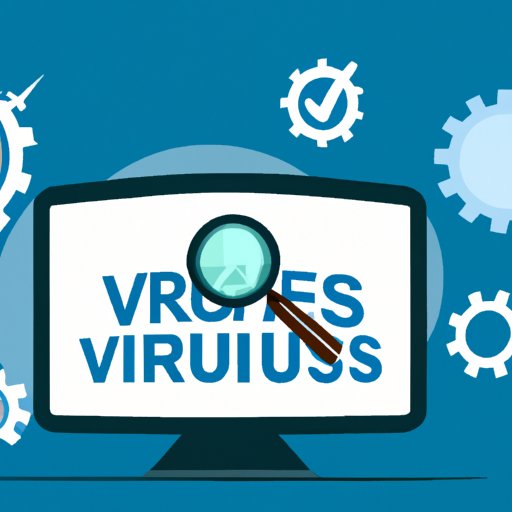
Introduction
Viruses are malicious programs designed to harm your computer, steal your personal information, and even launch attacks on other devices. Having a virus on your computer can lead to endless headaches, from annoying pop-ups to irreversible damage to your files and system. Therefore, it’s crucial to know how to get rid of viruses and prevent them from infecting your computer in the first place. In this article, we’ll provide you with a step-by-step guide to removing viruses from your computer, introduce you to the best antivirus programs, and share effective strategies to protect your computer from future viruses.
How to Remove Viruses from Your Computer: A Step-by-Step Guide
The first and foremost step to removing viruses from your computer is to disconnect from the internet and back up any important files. This will prevent the virus from spreading and ensure that you don’t lose any critical data.
Next, you should scan your computer using antivirus software. Choose a reputable program, such as Norton Security, McAfee Total Protection, or Avast Free Antivirus, and make sure to update it before running a full system scan. The antivirus software will detect and quarantine any infected files or programs, and notify you of any potential threats.
If the antivirus software fails to remove the virus completely, or if you suspect that the virus is still lurking in your system, you may need to resort to manual removal. This involves identifying suspicious files, stopping any suspicious processes, and deleting any unwanted applications. Be careful not to delete any essential system files, as this can cause irreversible damage to your computer.
After removing the virus, it’s essential to verify that the removal was successful by running another scan and checking for any remaining symptoms. If everything looks good, you can reconnect to the internet and resume your computer use.
The Best Antivirus Programs for Keeping Viruses at Bay
Investing in a good antivirus program is essential for protecting your computer from viruses and malware. When selecting an antivirus program, you should consider factors such as effectiveness, ease of use, cost, and additional features. Some of the most popular antivirus programs include Norton, McAfee, and Avast, all of which offer basic and advanced protection options.
If you’re looking for a free antivirus program, you may consider Avast Free Antivirus or Bitdefender Antivirus Free. Both programs offer decent protection against viruses and other threats without costing a penny.
For those who require more comprehensive protection and additional features, you may consider Norton 360 with LifeLock, Kaspersky Total Security, or Bitdefender Total Security. Each program has its own unique benefits and can suit different needs and budget requirements.
How to Protect Your Computer from Future Viruses
Preventing viruses from infecting your computer is just as important as removing them. Here are some effective strategies to safeguard your computer from future virus attacks:
Safe Browsing: Avoid visiting suspicious websites or clicking on pop-ups and ads. Use ad-blockers and privacy extensions to minimize the risk of malware infection.
Email Security: Be cautious of scams and phishing attempts, and don’t open attachments or click on links from unknown sources. Check for suspicious emails that may contain viruses.
Updating and Backing Up: Keep your operating system, software, and data updated to minimize vulnerabilities and security holes. Create regular backups of your files and store them in a secure location.
Learning from Past Incidents: Analyze how the virus entered your system and avoid similar mistakes in the future. Be aware of the latest virus trends and educate yourself on how to protect your computer.
Common Signs That Your Computer Might Have a Virus
Knowing the signs of a virus infection can help you take action quickly and avoid further damage to your system. Here are some common symptoms that may indicate your computer has a virus:
Slow Performance: Your computer may run sluggishly or take longer to start up and run applications.
Crashes: Your computer may freeze or crash frequently, or programs may shut down unexpectedly.
Error Messages: You may receive error messages or notifications that suggest something is wrong with your computer.
Unexplained Network Activity: Your computer may send or receive data without your knowledge, or network traffic may increase substantially.
Strange Pop-Ups: You may encounter unwanted pop-ups or ads that appear randomly or refuse to close.
The Do’s and Don’ts of Virus Removal
Removing viruses from your computer can be a delicate process that requires caution and attention. Here are some do’s and don’ts to keep in mind:
Things to Avoid: Don’t download unknown software from untrusted sources, open suspicious emails, or click on links from unknown sources. Be wary of anything that seems too good to be true.
Best Practices: Disconnect from the internet and run scans in Safe Mode to prevent the virus from spreading. Verify file signatures and seek professional help if needed. Follow the steps outlined in this article to remove the virus safely.
Possible Risks and Consequences of Incorrect Removal: Incorrect virus removal can lead to data loss, system damage, and even legal liabilities. Be sure to double-check everything before proceeding with any manual removal.
Conclusion
Viruses are a constant threat to computer security, but with the right knowledge and tools, you can remove them effectively and prevent further infections. Follow the steps outlined in this guide, invest in a good antivirus program, and adopt safe computing practices to keep your computer healthy and secure. Remember that prevention is always better than cure, so be proactive in protecting your computer from viruses.





